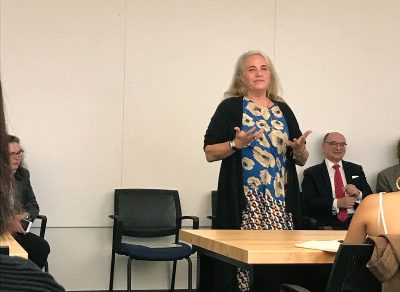
Disney Pixar’s “Coco” takes the audience on a journey through the Land of the Dead when character Miguel enters it on El Día de los Muertos, a Mexican holiday on Nov. 1 that celebrates and honors deceased loved ones. This Thursday on Día de los Muertos, “Coco” producer Darla Anderson journeyed onto campus to give students an in-depth look into her career.
Anderson’s talk was hosted by the Boston University Center for Latin American Studies and the BU Arts Initiative, and the audience was made up of professors and students of various disciplines.
Before Anderson spoke to the crowd, she was introduced and thanked for Pixar’s accurate and lively representation of the Day of The Dead. The audience applause that followed was thunderous.
Benjamín Juárez, a professor of fine arts at BU, moderated the discussion and a Q&A with the audience.
“We want to make this an informal conversation,” Juárez said at the talk.
Anderson opened up to the room of more than 30 people about being homeless when she was a teenager after her mother died. She said her experiences were difficult, but they gave her the resilience she thrives on today.
“Whenever tragedy hits, if you’re listening, something wise will hit you,” Anderson said during the talk. “I then knew I always wanted to be someone who changed the world with art.”
Anderson was involved in the production of 20 Pixar pictures, both feature films and animated shorts, and won an Academy Award for “Coco.” However, according to Anderson, she was just one person in a team of creatives who made those films happen.
Anderson said that her love for Mexican culture started when she was young and growing up in East Los Angeles, California, with many immigrants from Mexico. She shared that she frequently travels to Mexico.
She said she was excited when the director of “Coco” came to her with the idea of making a film about the Day of The Dead.
“I have always loved that culture,” Anderson said in an interview. “[At Pixar] we were all in unison with the idea.”
Despite her knowledge of Mexican culture, Anderson said the production sought out external help in making the movie. Marcela Davison Aviles, lead cultural consultant to the film, attended the event and provided insight.
“Leadership starts at the top, and Darla opened the doors,” Davison Aviles said in an interview with The Daily Free Press. “They invented what I call ‘community-based filmmaking.’”
She said she worked on the film for over six years helping with dialogue, the music and “making sure that the depiction of the Day of The Dead traditions would be historically accurate and culturally accurate.”
Anderson said culture is very important to her, and she hopes to make another movie about a different culture.
“I want to help people make their own movie and find directors and voices in that community,” Anderson said at the talk. “I want to do it in a way that’s responsible, respectful and inclusive.”
Carmen Alanis, chief officer at National Autonomous University of Mexico (UNAM), gave Anderson a certification “for her outstanding contribution to the dissemination of Mexican cultural traditions and values around the world” on behalf of UNAM.
“Thank you very much, because you made it,” Alanis said to Anderson at the talk. “You spread Mexican culture and tradition.”
Alongside that certificate, Anderson also received a verification of special recognition for her artistic achievements and promotion of Mexican culture from the Consulate General of Mexico in Boston.
Joe Guptill, a sophomore in College of Communication, said he saw a random flyer to come to the event and was very glad he made the decision to attend.
“I took away many things from the conversation, but the main theme was how important this film was and how important culturally diverse films are,” Guptill said.
Anderson concluded with sharing an inside scoop that the movie’s original release date was in 2015 but was postponed because of the Disney/Pixar merger. She said the timing of the release in 2017 couldn’t have been more perfect for the social and political climate.
“We are writing a love letter forever to Mexico,” Anderson said in the Q&A. “That we are all so much more alike than different. We all share a love for family and tradition.”

















































































































